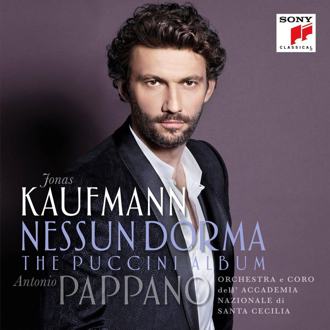
This disc represents the fourth in what is an unorthodox discography being
compiled by Jonas Kaufmann on Sony Classical. His Award-winning Winterreise
and his bilingual Tauber tribute album are now flanked by discs of two great
Italian opera composers. If his early Verdi album felt like something of a
rush job, this new Puccini disc is a higher-quality product, with Kaufmann’s
reassuringly expensive-sounding voice finding luxurious and ardent support
from Antonio Pappano and his Santa Cecilia Orchestra, whose contributions,
not coincidentally, were so important in making the tenor’s Decca verismo
disc so fine.
There are shades of that recital here and the arias
from Edgar and Le Villi recapture some of that rugged, rousing verismo form.
Those roles recently essayed or likely to be in Kaufmann’s sights in the
near future are also largely excellent. Dick Johnson suits his
poetico-heroic manner well, although there have been sturdier performances
of ‘Ch’ella mi creda’ on disc (turn to the remarkable but underrated
Giuseppe Giacomini on his Bongiovanni recital for one). Luigi’s ‘Hai ben
ragione’ from Tabbaro is similarly impressive, and there are few quibbles
with Kaufmann in the title track, delivered (as the disc’s finale) with his
trademark purring, mahogany-tinged tone and rising to a ringing top B.
But there are moments in ‘Non piangere Liù’ (alas cut short, through
lack of extended ensemble, before ‘Ah! Per l’ultima volta’) that strike me
as indulgent from singer and conductor. The extracts from Manon Lescaut that
open the disc, by far the most extensive, are also a touch disappointing.
Kristı¯ne Opolais, Kaufmann’s Manon in recent Munich and London productions
(the latter due for release on Sony DVD next month, with extracts included
among the goodies on an extra DVD in the deluxe edition of this release),
joins him for three of the tracks but is underpowered and pallid, snatching
at notes to which she should be able to soar.
As the disc goes on,
the standard frustration with such bleeding-chunk programming also grows.
The central part of the disc feels especially bitty: only a couple of
minutes each of Butterfly (an ardent ‘Addio, fiorito asil’), Tosca, Rondine,
Tabarro and Gianni Schicchi. The questionable wisdom of Kaufmann’s desire to
include an extract from each of Puccini’s operas (minus, of course, Suor
Angelica) is emphasised by the latter, too, in which Rinuccio’s elegant
little aria is delivered with unwelcome Wagnerian heft and little grace. The
chinks in Kaufmann’s armour – delivery can be more about emphatic extremes
than long lines and a voice that is magnificent but short on squillo and
colouristic variety – are also exposed in the Bohème duet. This had me
reaching for the young Pavarotti and Freni on Karajan’s 1972 Decca
recording, although the decision here to take the lower (written) option at
the close is most welcome.
This disc shows that, at his best in the
right repertoire, Kaufmann remains peerless today. But its being released so
close to Warner’s new Aida also raises a question: when can we can expect
something more substantial from the Kaufmann-Sony partnership?
|